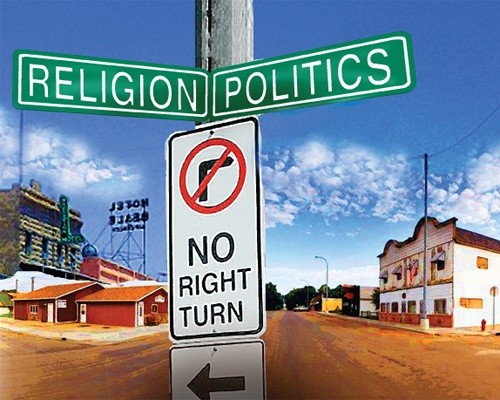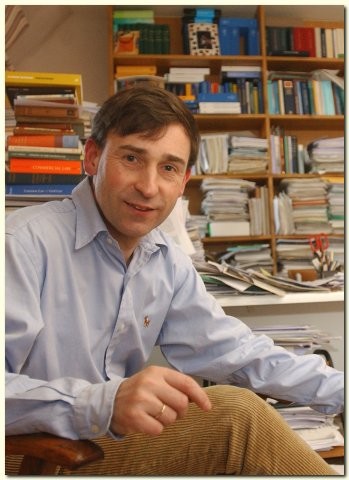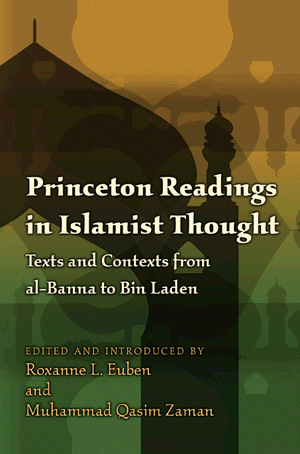 Roxanne L. Euben and Muhammad Qasim Zaman, eds.
Roxanne L. Euben and Muhammad Qasim Zaman, eds.
Princeton Readings in Islamist Thought: Texts and Contexts from al-Banna to Bin Laden [2]
Princeton: Princeton University Press, 2009
There is a tendency among people concerned one way or another with Islam to resort to various cherry-picked Quranic teachings and quotes in order to demonstrate that Islam is either “good” or “bad.” But just as the Bible cannot provide a complete picture of what the Catholic Church practices today and why it does so, the Quran cannot provide a complete picture of the contemporary practice of Islam. For this we need to turn to the writings and teachings of more recent serious Islamic thinkers, in particular those of the Islamist variety.[1] It is they who have set the political philosophical tone of contemporary Islam. Upon familiarizing oneself with this body of literature, one realizes that the problem of Muslims in white societies is far greater than most people even realize.
As more and more Muslims invade the West, there is a greater need to understand them as they are now. A knowledge of early Islamic history is necessary and valuable but it cannot serve as one’s main source of critique. Nor, for that matter, can footage of brown hordes rampaging across white lands provide us with anything deeper than visceral disgust, however justified and strategically animating that feeling may be. Knowing that Muhammad was a pedophile and watching the latest videos of “refugees” angrily tossing away non-halal food donations and complaining about bad internet connections still leaves a vast historical middle ground of highly relevant and often untapped knowledge. Within this historical space, the 20th century is the most important focal point because it is during this time that Islam became the highly politicized force with which we are currently dealing.[2]
Understanding Islamism is not, in fact, particularly hard. There has only been a relatively small number of influential Islamist intellectuals and they, more often than not, simply stole their ideas from European philosophers and placed them in an Islamic context. However, these few intellectuals have been so influential in the past century or so within the ever-encroaching Islamic world that it is well worth becoming acquainted with them. An excellent way to do this is with the book Princeton Readings in Islamist Thought, a collection of various Islamist texts, edited and with introductions by Roxanne Euben, a political scientist at Wellesley College, and Muhammad Qasim Zaman, a professor of Near Eastern studies at Princeton University.
The book begins with an introduction that is typical of modern academic writing on any controversial subject. It gives the reader an impression of the current intellectual climate as much as it does of the subject matter itself. For example, the editors attempt to “situate” Islamism (p.5). When an academic proclaims his desire to “situate” anything, the critical reader should be especially alert because it usually means that the author is about to whitewash his subject, drowning it in contemporary dogma and intellectual fashion. Unsurprisingly, Drs. Euben and Zaman do just that. For example, they state at one point in a section entitled “Islamism and Violence,” that the “fact that some Islamist thinkers sanctify violent struggle . . . does not mean, of course, that all those who advocate or engage in jihad endorse violence” (p. 45). This is followed by: “. . . for true believers, jihad is no less than an enactment of a divine imperative to remake the foundations of collective life. In this respect, Islamist views of jihad can be seen as part of a long-standing association between violence and political foundings upon which no particular culture or historical epoch has a monopoly” (pp. 45-46). Such a condescendingly childish qualification would not need to be made in a university press publication on most other subjects. Even so, one must question their logic. If “true believers” associate jihad with the violence of “political foundings” does that not mean that Islamism is, at its very core, violent? Wouldn’t an Islamist who explicitly opposed all violent jihad (if one could be found) then cease to be an Islamist? Despite such efforts at careerist diplomacy, the texts that make up the bulk of the book make quite clear that violent jihad is not only a major concern of Islamist thought generally but that it is the central political concern. To be sure, the editorial content is not without merit but, for our purposes, the value of this book is in the Islamist texts themselves.
Princeton Readings in Islamist Thought is organized into five parts. The first part, entitled “Islamism: An Emergent Worldview,” deals with early Islamist thinkers who rose to prominence during the various anti-colonial struggles across the Muslim world in the early to mid-20th century: Hasan al-Banna (1906-1949), an Egyptian who formed the Muslim Brotherhood; Sayyid Abu’l-a’la Mawdudi (1903-1979), an Indian/Pakistani Muslim who founded the Jam’at-i Islami; Sayyid Abu’l-Hasan ‘Ali Nadwi (1914-1999), an Indian Muslim member of the Tablighi Jama’at; and Sayyid Qutb (1906-1966), an Egyptian member of the Muslim Brotherhood who has since been referred to by Jewish journalist Paul Berman as “The Philosopher of Islamic Terror” (p. 129).[3] The work of these men has had a tremendous impact on the Muslim world, setting in place what would be common themes within Islamist thought in the years to follow. The most important conceptual development common to these early Islamists, one that essentially frames all others, is the idea of Islam as a world system, a complete and perfect global theocracy. This is the key to understanding all that follows and to realizing the true extent of the Muslim threat.
Traditionally, the ulama (Muslim religious scholars) tended to separate religion from politics. Under colonial rule, this became an increasingly unsatisfactory position for many Muslims, and new politically-oriented Islamist thinkers began to gain prominence in the Muslim world. It seemed obvious to them that the political was inseparable from the religious. Indeed, as the political is an inescapable phenomenon of any human community, Muslims were duty-bound to steer politics in an Islamic direction. Thus the Quran became not only a religious text but a political program for the colonial and post-colonial Muslim world. In the words of Mr. Banna: “No regime in the world will supply the renascent nation with what it requires in the way of institutions, principles, objectives, and sensibilities to the same extent that Islam supplies every one of its renascent nations” (pp. 59-60). Mr. Qutb goes even further when he states that Muslims must “assume the leadership of humankind” (p. 138). This is, quite obviously, distinctly political language. The notions of an Islamic “regime” and Muslim “leadership” were exciting and appealingly modern to disaffected Muslims, who were, in this period, often torn between the obvious material benefits of white modernity, the anti-imperialism of Marxism, and the somewhat old-fashioned and tame, but deeply ingrained and comfortable, Islam of the ulama.
By the late colonial period of the 20th century, not only was the West physically dominating Muslim lands but, certainly in the eyes of the Islamists, it was also culturally dominating them. Much has been written about the psychological effects of colonialism on the colonized — the retreat into fantasies of past glory, the tension between the longing for Western material success and the desire for cultural sovereignty among the subordinated autochthonous populations — but nowhere is this more clear than in the Muslim world at this time. The reconciliation of the stagnation of Islamic civilization with the obvious technological, scientific, and economic superiority of the West was of utmost importance to those trying to build an Islamic global empire. If Islam was correct in all ways — as it had to be for believers — then why were Muslim lands under foreign rule and why were Muslims being outpaced in every single measure of material and organizational success? There were two possible answers: “bad Muslims” or the notion that the West was lacking some spiritual truth that only Islam could provide.
In order to begin the process of realizing the Islamic world system, a newly energized and committed Muslim had to be created. This was the primary project of Mr. Mawdudi, who perhaps more than any other, made a compelling case for this new breed. A learned man, deeply knowledgeable of Islam as well as European philosophy, he devoted his life to promulgating a radical Islamic faith through personal spiritual transformation, which would, he believed, necessarily lead to political activism. The future required first a revamping of the individual’s relation to his faith. The degraded state of the Islamic world was at root the result of what he perceived as a collective historical drift away from Islamic truth. He explained Muslim cultural degeneration in terms familiar to post-colonialists: “Political slavery gave birth to an inferiority complex, and the resultant intellectual serfdom eventually swept the entire Muslim world off its feet. . . The ultimate consequence of this evil situation was that when Muslims woke up again to the call of progress, they were incapable of looking at things except through the colored glasses of Western thought” (pp. 86-87). This inferiority complex caused them to doubt their own value, leading them to gradually succumb to the insidiousness of foreign cultural norms, a phenomenon that crossed class and educational barriers. Indeed, for Mr. Mawdudi, the Muslim elites, especially the ulama, were largely to blame and remained a special target for him throughout his life. They had failed to tend to their flock, failed to live by and enforce shari’a law, and for this the entire Muslim world was now suffering.
Mr. Qutb tended to emphasize what he saw as the spiritual bankruptcy of the West in his efforts to counter its painfully clear material dominance. For him, the West was superior only in superficial areas of human existence. In his last book Signposts Along the Road, published in 1964 and excerpted in this reader, he wrote: “It is not easy to disregard such achievements and blame those who invented them, especially as the so-called Islamic world is almost devoid of such accomplishments. Yet in spite of all these considerations, it is still essential to “revive” Islam” (p. 138). He goes on to say:
. . . we must clearly understand — in exact terms — this umma’s [the greater Muslim community] qualifications for the leadership of humankind. The Muslim community now is not capable — nor required — to present evidence of extraordinary material achievements in order for humankind to bow down before its supremacy and appoint it to world leadership . . . To assume the leadership of humankind, then, it is essential to have a quality other than material creativity. This is none other than the “faith” and “way of life,” which both enable humanity to preserve the fruits of material progress and fulfill the needs of human nature. This faith and program must then be actualized in a human collectivity — that is, a Muslim society (p. 138).
The qualifications possessed by the Muslim community, according to Islamists, are simply the complete acceptance of, and obedience to, the divine law contained in the Quran, the necessarily perfect plan for the entirety of humanity.[4]
For Islamists, anything that is not explicitly Islamic is, to use Mr. Mawdudi’s term, “un-Islam.” They believe that all who deviate from their interpretation of the basic tenets of Islam, including other Muslims, are enemies. Islam is the word of God and the word of God cannot be challenged except by evil men. In a Hegelian sense, Islam is the end of history — a state of perfection for which no antithesis can rationally exist. The enemies of Islam are the enemies of man, of history, of the universe itself. Indeed, to hold this rigid position and not believe in the validity of violent jihad would require conceptual contortions and obfuscations the likes of which are usually absent outside of the Judaized world.
It is true that jihad is not necessarily violent. The word only means “struggle.” And the word “struggle” connotes as many things for Muslims as it does for anyone else. However, in the context of the larger Islamist worldview and, crucially, in the words of the Islamists themselves it is quite clear that opinions on the use of violence range only from “acceptable in certain situations” to “required.” We see this train of thought developing in early Islamist writings. It is again worth quoting the “philosopher of terror,” Mr. Qutb, at length:
Jihad is essential for the Islamic message if it is to be taken seriously as a declaration of the liberation of man, because it cannot confine itself to theoretical and philosophical arguments. It must confront existing situations with effective means, whether the land of Islam is secure or under threat from neighboring powers. As Islam works for peace, it is not satisfied with a cheap peace that applies only to the area where people of the Muslim faith happen to live. Islam aims to achieve the sort of peace that ensures that all submission is made to God, and none of them take others for their lord (p. 150).
And here is Mr. Nadwi on jihad:
There can be nothing more noble for a Muslim than the earning of God’s pleasure through complete submission to His will. For this, a long and sustained inner struggle is required against the false deities that may lay claim to his spiritual allegiance, as well as against all those whims and desires that may try to lure him away from goodness and piety. When this has been attained, it becomes his moral responsibility to exert himself for the improvement of his fellow beings and the establishment of Divine sovereignty over the world around him (pp. 112-13).
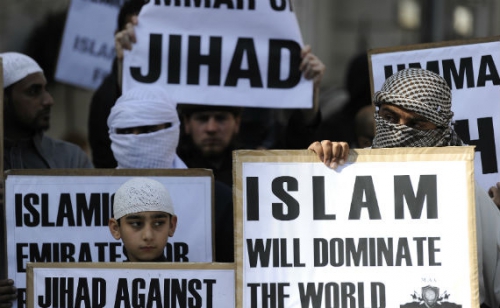
The concept of jihad as an amalgamation of personal internal struggle and collective political struggle was a marked shift in understanding. This shift was to be further refined by the next generation of Islamists.
The second part of the book, “Remaking the Islamic State,” deals with this second generation: Ayatollah Ruhollah Khomeini (1902-1989), the very well-known leader of the Iranian Revolution; Muhammad Baqir al-Sadr (1934-1980), the Iraqi Shi’i leader who was executed by Saddam Hussein and whose name will forever remain etched in the minds of many in the name of Sadr City, the infamous Shi’a slum in Baghdad; Hasan al-Turabi (1932- ), the Sudanese religious leader; and Yusuf al-Qaradwi (1926- ), an Egyptian with close ties to the Muslim Brotherhood. By the time these men appeared on the scene, the basic Islamist positions — “revivalist” spiritual reform and collective political struggle towards an Islamic empire — had been set. It was now up to them to continue the work towards Islamic global dominance and doing this required a bit of intellectual and political finesse.
Earlier Islamist thinkers had rejected nationalism as a politically and spiritually limiting Western construct. The nation-state was not a social unit that concerned them because the larger Muslim community itself was not limited to particular nations, and the desired Islamic world system was necessarily supranational. Still, practical politics had to be taken into account and so Islamists worked within national political parameters even while ultimately rejecting the concept. Mr. Khomeini argued that:
No one can say it is no longer necessary to defend the frontiers and the territorial integrity of the Islamic homeland. . . Any person who claims that the formation of an Islamic government is not necessary implicitly denies the necessity for the implementation of Islamic law, the universality and comprehensiveness of that law, and the eternal validity of the faith itself (p. 165).
Dr. Turabi clarified this seemingly un-Islamist position:
. . . an Islamic state is not a nationalistic state because allegiance is owed to God and thereby to the community of all believers . . . [the Islamic state] would work toward the eventual unity of the umma and beyond. Ultimately there is nothing final even about the so-called Muslim world or Muslim nation, because Islam is open to humanity, is universal . . . The state is only the political dimension of the collective endeavor of Muslims (pp. 214-15).
The efficacy of 20th century nationalist movements in overcoming colonialism coupled with the unavoidable reality of the global state system forced these Islamists to be realistic in ways that the earlier generation had often resisted. The nation-state began to be seen as a manageable, albeit ultimately temporary, political unit through which to accomplish their long-term goals. By accepting the usefulness of national politics, Islamists began to think realistically about how their states were to be organized. Questions of law, democracy, and economics had to be dealt with more explicitly than they had been previously. There is a great deal of information in this volume regarding the Islamist vision of the state but the important general point is that, for Islamists, the state is a mere stepping stone on the path to global theocracy.
The third part of the book, entitled “Islamism and Gender,” contains writings by various Islamists on the role of women in Islamic societies: Murtaza Mutahhari (1920-1979), a key figure in the Iranian Revolution; Zaynab al-Ghazali (1917-2005), an Egyptian woman, characterized by the editors as Islamism’s “largely unsung mother” (p. 275); and Nadia Yassine (1958- ), “the highly visible if unofficial spokeswoman for the most popular Islamist group in Morocco, Jama’at al-‘Adl wa-l-Ihsan” (p. 302). Unless one is living in a Muslim society or is a student of feminism, these chapters offer little in the way of intellectual stimulation. Mr. Mutahhari spends much time articulating the difference between equality and identicalness and Miss Ghazali describes her work alongside the Muslim Brotherhood and her fond memories of spending time group-reading and group-studying the Quran. There is little here of interest for the New Rightist reader. But if any have ever wondered whether or not there were social justice warriors in Islamist circles, Miss Yassine provides the answer in stilted, tedious prose. She writes: “. . . reviving the Islamic faith consists in denouncing the rerouting of history by regimes that have imposed patriarchy and autocracy on our societies” (p. 314). And: “Our reading of the sacred texts is at odds with the ossifying ideology built up over the course of time by a body of exegetes who sapped all dynamic from Islamic Law” (p. 315). She also defends the hijab in similar style: “When a woman wears the Islamic scarf, she reclaims her spirituality, reconquers the public sphere (because the Islamic scarf is a projection of the private sphere within the public space), and finally makes a political declaration of dissidence against the established order, be it national or international” (pp. 316-17).
The fourth part of the book is entitled “Violence, Action, and Jihad.” It includes writings by Muhammad ‘abd al-Salam Faraj (1954-1982), an Egyptian electrical engineer and member of the Jama’at al-Jihad, the group that assassinated Egyptian president Anwar al-Sadat in 1981, as well as by ‘Umar ‘abd al’Rahman (1938- ), an Egyptian sheik involved with the 1993 bombing of the World Trade Center in New York and the assassination of Rabbi Meir Kahane. Also included is the Hamas charter, writings by Muhammad Husayn Fadlallah (1935- ), an Iraqi religious scholar based in Lebanon who has been referred to as the “spiritual leader of the Hizbullah” (p. 390), as well as a Taliban rule book and an interview with a Taliban leader.
As the section title would indicate, the concept of jihad is dealt with in more detail here. Every page contains some insight into exactly how important it is to Islamists. Mr. Faraj, dealing with those who suggest that jihad does not have to be violent, responds that this type of person “is not interested in Islam or is a coward who does not wish to stand up for the Rule of God with firmness” (p. 330). He rejects entryism, propaganda, scholarship, traditional politics, and, interestingly, emigration. All of these things he argues are a move away from God and only serve to prolong the existence of the “pagan state.” This position directly reflects the attitudes of earlier Islamists but there is a greater sense of urgency in his writings, something common among the more recent generation of Islamists. Simply put, violence is essential. Commenting on a Quranic verse in which Muhammad states that if his followers fight the infidel “God will punish them . . . will humiliate them and aid you against them, and will bring healing to the breasts of people who are believers” (p. 335), Mr. Faraj writes that “a Muslim has first of all the duty to execute the command to fight with his hands” (p. 335). Over the course of Islamic history there have been various religious scholars who tried to dampen the obvious inherent violence in such famous Quranic passages as the “Verse of the Sword,” arguing that jihad was primarily an internal struggle of the soul, but Mr. Faraj accuses them — in common Islamist fashion — of belonging to the category of “bad Muslims.”[5] He writes: “The only reason for inventing this tradition is to reduce the value of fighting with the sword, so as to distract the Muslims from fighting the infidels and the hypocrites” (p. 342). And he even offers advice to young, aspiring jihadists: “Know that when jihad is an individual duty, there is no (need to) ask permission of (your) parents to leave to wage jihad . . .” (p. 341).
 Mr. ‘Abd al-Rahman holds similar positions. He writes: “The very existence of a threat to the social order is in itself justification for the overthrow of the regime” (p. 350). It is important to bear in mind that the word “regime” is not qualified. The “regime” could thus be any regime under which Muslims live. One must always keep in mind the basic fact that Islamists are intent on world domination, on implementing theocracy wherever they reside, even when it seems as if they are engaged in purely nationalist struggle, as is the case with Hamas, an organization that devotes itself to the Palestinian cause and freely uses nationalist rhetoric. Article 5 of the Hamas Charter states:
Mr. ‘Abd al-Rahman holds similar positions. He writes: “The very existence of a threat to the social order is in itself justification for the overthrow of the regime” (p. 350). It is important to bear in mind that the word “regime” is not qualified. The “regime” could thus be any regime under which Muslims live. One must always keep in mind the basic fact that Islamists are intent on world domination, on implementing theocracy wherever they reside, even when it seems as if they are engaged in purely nationalist struggle, as is the case with Hamas, an organization that devotes itself to the Palestinian cause and freely uses nationalist rhetoric. Article 5 of the Hamas Charter states:
The historical dimension of the Islamic Resistance Movement originates from its adoption of Islam as a system of life. It reaches far back to the birth of the Islamic Message and to the Pious Predecessors. Therefore, Allah is its goal, the Messenger its leader, and the Qu’ran its constitution. . . As for its geographic dimension, it is wherever Muslims — those who adopt Islam as a system of life — are found, in any region on the face of the earth . . . (p. 367)
In Article 8, these notions are reiterated in more dramatic fashion with an addendum stating that jihad is Hamas’s “methodology” and that death “for the sake of Allah is its most coveted desire” (p. 369). One might support the Palestinian cause as a legitimate nationalist movement, but when understood in the grand Islamist context, the language used by Hamas clearly indicates that it has much in common with the transnational ideology preached by earlier Islamists. There is absolutely nothing in Islamist literature to indicate that, once political sovereignty has been acquired, the Islamists will content themselves with local rule. Indeed, the opposite is the case.
This fourth section also contains a reprint of an interview with Mr. Fadlallah which, while also dealing with jihad, contains some interesting commentary on Islamist ethics that reveals the deep similarity between Muslim and Jewish thought. The rupture between endogenous and exogenous ethics is made readily apparent. He states:
A negative value may be transformed into a positive value if it serves the public good. Lying is wrong. However, if speaking the truth means betraying one’s umma, then telling the truth would be wrong and lying would be right. Speaking ill of someone behind his back is wrong, but when doing so means warning others of his vices so as to help them avoid problems that could arise from contact with him, it could be a duty. When the welfare of mankind is served by a negative value, it is transformed into a positive value (p. 398).
Concerned as he is with ethics, however foreign to white Western minds his version may be, he does see a difference between, for example, the September 11th attacks and blowing up Jewish civilians in Israel. He argues that the World Trade Center attack was unjustified because most Americans “are generally uninterested in their country’s foreign policy” and so ignorant Americans are not legitimate targets. Israelis, however, consider Palestinian deaths part of the cost of war, and so Palestinians are justified in killing Israeli civilians. The logic is not quite sound, but he, perhaps unwittingly, reveals his true position a bit later. It becomes clear as the interview progresses that Mr. Fadlallah simply believes that the World Trade Center attacks did not benefit the Islamist cause — which, as it so happens, turns out to be the main reason why he condemns it. He states that “what happened has opened wide the gates of the world to America, making the whole world subject to it. . . . This is why I say to those who think that such acts can be justified for the sake of the larger goal, that no larger goal can be achieved using such methods, which can actually bring about the opposite outcome” (p. 406).
The fourth part of the book ends with a short discussion of the Taliban, including a reprint of a Taliban laheya (program or rule book). Most of it is just basic run-of-the-mill paramilitary organizational strategy. But it is humorous at times. Some of the more comical rules include: “Taliban may not use jihad equipment or property for personal use” (p. 415); “Mujahidin are not allowed to take young boys with no facial hair into the battlefield or into their private quarters” (p. 416); “Anyone who works as a teacher for the current puppet regime must receive a warning. If he nevertheless refuses to give up his job, he must be beaten. If the teacher still continues to instruct contrary to the principles of Islam, the district commander or a group leader must kill him” (p. 417). In an interview with Taliban leader Mullah Sabir regarding the release of the above referenced laheya, he is asked about the efficacy of and reason behind the Taliban campaign of suicide bombings. He responds by saying that the “suicide bombings are a tactic with which we drive the enemy to panic. Without this miracle weapon [italics mine] we would never accomplish our goal of reconquering all of Afghanistan” (p. 420).
In the fifth and final part of the book, “Globalizing Jihad,” the editors include Usama Bin Laden’s (1957-2011) “Declaration of War Against the Americans Occupying the Land of the Two Holy Places” and the final instructions to the World Trade Center attackers written by Muhammad ‘Ata al-Sayyid (1968-2001). Mr. Bin Laden’s writing hits all of the major points covered by previous Islamists: the failure of the ulama to adequately enforce Islamic law; the duty of Muslims to wage jihad; the tremendous Zionist problem; a healthy dose of post-colonial rhetoric; a smattering of historical anecdotes interspersed with Quranic verses; and the communal unity of all Muslims across the globe. Like Mr. Faraj, he too believes that the children are the future. He writes of the new generation of radical Muslim youths: “Those youths know that their reward in fighting you, the United States, is double the reward for fighting someone not from the People of the Book [Jews and Christians]. They have no intent other than to enter Paradise by killing you. An infidel and enemy of God like you cannot be in the same hell with his righteous executioner. . . The youths you call cowards are competing among themselves to fight and kill you” (p. 453). He adds: “Terrorizing you, while you are carrying arms on our land, is a legitimate and moral duty” (p. 457). And before ending with a prayer to Allah, he writes: “O you [soldiers] of Allah, ride and march on. This is the time of hardship, so be tough. And know that your gathering and cooperation to liberate the sanctuaries of Islam is the right step toward unifying the word of the umma under the banner of ‘No God but Allah’” (p. 458). One could argue that Mr. Bin Laden is the quintessential Islamist, not only in terms of face and name recognition, but in terms of ideological and political comprehensiveness.
One of the problems in dealing with Islamism is that it contains ideas that are, to varying degrees, appealing to racially-aware whites, particularly those in the New Right: tribal loyalty, social conservatism, the willingness to make sacrifices for a greater cause, and the fearless combating of Jewish political and cultural hegemony. Admirable and appealing as these qualities may be to whites who desire the awakening of similar qualities in their own people, they are precisely the qualities that make Islamism (and any Muslim presence in white lands) such a tremendous practical threat to whites. There are those who argue that Islam is a problem that can be contained, that it can act to foil Jewish influence, that because some of their values overlap with those of the New Right they are natural allies. These beliefs are, however, terribly misguided and naive. There can be no compromise with those who desire to remake one’s civilization by force, to assert their ideological dominance in every facet of human existence, and who preach universalist ideas that would contribute to the destruction of the white race.
Much like the Jew, the Islamist hides in plain sight. Under the nauseatingly ubiquitous protecting veil of tolerance, humanitarianism, and anti-racism, these enemies conspire against whites while enjoying — and developing ravenous appetites for — the benefits of white civilization. If given the chance to be implemented, their theocratic “end of history” would spell the end of our history. The texts in this book make this crystal clear.
Notes
1. Though I believe that the term “Islamist” is, in part, a way to shield Islam itself from criticism, it is commonly used and accepted and for the sake of ease I will use it here.
2. There will be no discussion here of Jewish influence on Middle Eastern politics and its role in Muslim political radicalization, not because I feel it is irrelevant–quite the contrary–but because it is outside the scope of this review.
3. Paul Berman, “The Philosopher of Islamic Terror,” New York Times, March 23, 2003, http://www.nytimes.com/2003/03/23/magazine/the-philosopher-of-islamic-terror.html [3] (accessed September 28, 2015).
4. Mr. Mawdudi, quoted in a different source, makes the universality of Islam even more clear:
This powerful law which governs and controls all that comprises the Universe, from the largest stars to the tiniest particle in the earth, is made and enacted by the Great Governor, whom the whole Creation obeys. The universe, therefore, literally, follows the religion of Islam, as Islam signifies nothing but obedience and submission to God, the Lord of the Universe. The sun, the moon, and the stars are thus all ‘Muslims’. The earth is also Muslim, and so are air, water, and heat. Trees, stones and animals are all “Muslims.”
Sayyid Abu’l-a-la Mawdudi, quoted in: Eran Lerman, “Mawdudi’s Concept of Islam.” Middle Eastern Studies Vol.17, No.4 (Oct.,1981): 497.
5. The Verse of the Sword: “Then when the sacred months have slipped away, slay the polytheists wherever ye find them, seize them, beset them, lie in ambush for them everywhere.” Q 9:5 (p. 337).



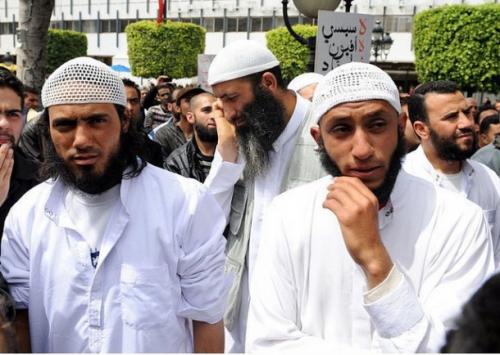

 del.icio.us
del.icio.us
 Digg
Digg